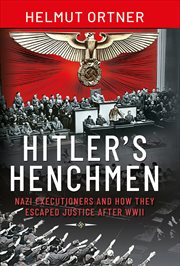Nonfiction
eBook
Details
PUBLISHED
Made available through hoopla
DESCRIPTION
1 online resource
ISBN/ISSN
LANGUAGE
NOTES
Helmut Ortner reveals a staggering history of perpetrators, victims and bystanders in Hitler's Germany. He explores the shocking evidence of a merciless era - and of the shameful omissions of post-war German justice. Johann Reichhart was a state-appointed judicial executioner in Bavaria from 1924 until the end of the war in Europe. During the Nazi era, he executed numerous people who were sentenced to death for resisting National Socialism, including many of those involved in the 20 July 1944 bomb plot on Adolf Hitler. As a member of the SS-Totenkopfverbände, the SS organisation responsible for administering the concentration and extermination camps, Arnold Strippel served at a number of locations during his rise to the rank of SS-Obersturmführer. These included Natzweiler-Struthof, Buchenwald, Majdanek, Ravensbrück and Neuengamme, where he was responsible for murdering the victims of a series of tuberculosis medical experiments. Like Reichhart, Erich Schwinge was also involved in the legal sphere during the Third Reich. A German military lawyer, in 1931 he became a professor of law and, from 1936, wrote the legal commentary on German military criminal law that was decisive during the Nazi era. Aside from the part they played in Hitler's regime, these three men all had one further thing in common - they survived the war and restarted their careers in Adenauer's Federal Republic of Germany. In Hitler's Henchmen, Helmut Ortner uncovers the full stories of Reichhart, Strippel, Schwinge and others like them, Nazi perpetrators who enjoyed post-war careers as judges, university professors, doctors and politicians. Had they been gutless cogs in the machinery of the Nazi state, or ideologized persecutors? Ortner reveals that it was not only their Nazi pasts that were forgotten, but how the suffering of the victims, including resistance fighters such as Georg Elser and Maurice Becaud, and their relatives was suppressed and ignored
Mode of access: World Wide Web







